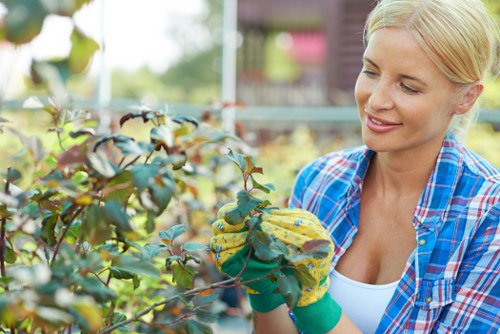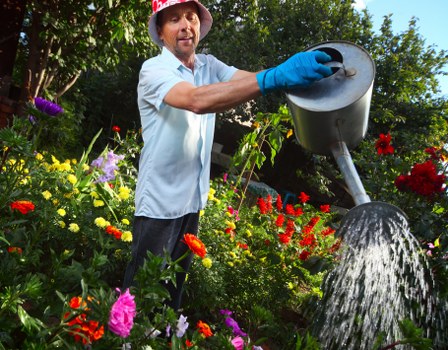Lawn Mowing in Mowing Sucks: Why It’s Time for a Change
The Frustration Behind Lawn Mowing

Lawn mowing is a task that many homeowners dread. The repetitive nature of the chore, coupled with the physical exertion required, often makes it seem like an endless battle against overgrown grass. Whether you have a large backyard or a modest garden, the sentiment remains the same: lawn mowing sucks.
One of the primary reasons lawn mowing is so unpopular is the time it consumes. Regular maintenance is essential to keep your lawn looking neat and healthy, but carving out time from your busy schedule can be challenging. Additionally, the noise from gas-powered mowers can be a nuisance, disturbing both your peace and that of your neighbors.
Moreover, the environmental impact of traditional lawn mowing cannot be overlooked. Gasoline-powered mowers emit pollutants that contribute to air pollution and greenhouse gas emissions. As more people become environmentally conscious, the drawbacks of conventional mowing methods become increasingly significant.
Physical Strain and Health Risks

The physical demands of mowing the lawn are another major factor that makes the task so unpleasant. Pushing a heavy mower back and forth can lead to muscle fatigue, joint pain, and even long-term injuries, especially for those who are not regularly active. The repetitive motion required to mow can also result in strain injuries, such as tendonitis and bursitis.
Furthermore, handling and maintaining lawn equipment carries inherent risks. Accidental injuries from blades, fuel spills, and improper handling of machinery are common concerns. These safety issues add another layer of complexity to an already arduous task.
For individuals with health issues or limited mobility, lawn mowing can become a daunting and sometimes impossible task. The physical barriers often prevent them from maintaining their lawns effectively, leading to frustration and a decline in the overall appearance of their outdoor spaces.
Cost Implications of Lawn Mowing

Beyond the time and physical challenges, lawn mowing comes with its own set of financial burdens. Purchasing and maintaining a quality lawn mower requires an initial investment, and ongoing costs can quickly add up. Regular maintenance, repairs, and replacement parts can be expensive, particularly for gas-powered models that require more upkeep.
In addition to equipment costs, fuel consumption is a significant expense for those using gas-powered mowers. The price of gasoline fluctuates, making it difficult to predict ongoing expenses accurately. This unpredictability can strain household budgets, especially for those looking to minimize their spending on home maintenance.
For homeowners with large lawns, the costs escalate even further. The need for multiple mowing sessions, additional equipment, and more fuel can make the overall expense prohibitive. These financial considerations often lead individuals to seek alternative solutions to traditional lawn mowing.
Alternatives to Traditional Lawn Mowing

Given the numerous drawbacks of traditional lawn mowing, many homeowners are exploring alternative methods to maintain their lawns. One popular option is hiring professional landscaping services. While this eliminates the need for personal involvement in mowing, it does incur regular service fees. However, the convenience and professional results often justify the cost for many individuals.
Another alternative gaining traction is the use of robotic lawn mowers. These automated devices can be programmed to mow the lawn at set intervals, reducing the manual effort required. While the initial investment may be higher, the long-term benefits include consistent lawn maintenance and reduced physical strain.
Natural lawn care practices, such as xeriscaping or creating native plant gardens, offer eco-friendly and low-maintenance alternatives. These methods reduce the need for frequent mowing and can be tailored to suit the local climate, resulting in a sustainable and aesthetically pleasing outdoor space.
Environmental Considerations

The environmental impact of lawn mowing extends beyond just emissions from gas-powered mowers. The removal of natural vegetation and the maintenance of large lawns can disrupt local ecosystems. Traditional lawns often require significant water usage, contributing to water scarcity issues in many regions.
Moreover, the use of chemical fertilizers and pesticides in lawn care poses risks to both the environment and human health. Runoff from these chemicals can contaminate local waterways, harming aquatic life and affecting water quality. These environmental concerns are prompting many to rethink their lawn care practices.
Embracing sustainable lawn care methods not only benefits the environment but can also enhance the health and beauty of your outdoor space. By reducing reliance on harmful chemicals and minimizing resource use, homeowners can create a more harmonious relationship with nature.
Technological Innovations in Lawn Care
- Robotic Lawn Mowers: Automated solutions for consistent mowing.
- Eco-Friendly Mowers: Battery-powered and electric models reduce emissions.
- Smart Irrigation Systems: Optimize water usage for healthier lawns.
- Mobile Apps: Schedule and monitor lawn care tasks remotely.
Technological advancements are revolutionizing the way we approach lawn care. Innovations such as robotic mowers and smart irrigation systems are making it easier and more efficient to maintain a healthy lawn without the hassle and drawbacks associated with traditional mowing techniques.
These technologies not only enhance convenience but also promote environmental sustainability by reducing energy consumption and water usage. As these solutions become more accessible, they offer viable alternatives for homeowners seeking to move away from the traditional, labor-intensive methods of lawn mowing.
Adopting these technologies can lead to a more streamlined and enjoyable lawn care experience, allowing homeowners to spend more time enjoying their outdoor spaces rather than maintaining them.
The Psychological Impact of Lawn Mowing
The repetitive and often tedious nature of lawn mowing can have a significant psychological impact on individuals. The stress associated with maintaining a perfect lawn can lead to frustration and mental fatigue. The pressure to uphold neighborhood standards and aesthetic expectations can exacerbate these feelings, making the task even more burdensome.
Moreover, the physical strain of mowing can contribute to feelings of exhaustion and burnout. This negative association can diminish the overall enjoyment of outdoor spaces, which should be a place of relaxation and leisure.
By seeking alternatives to traditional lawn mowing, individuals can alleviate some of the psychological stress and foster a more positive relationship with their outdoor environments. Simplifying lawn care can lead to increased satisfaction and a greater sense of well-being.
Community and Social Aspects
- Neighborhood Aesthetics: Maintaining a well-kept lawn contributes to the overall appearance of the community.
- Social Pressure: Expectations to have a manicured lawn can lead to unnecessary stress.
- Shared Responsibility: Community efforts can alleviate individual burdens of lawn maintenance.
- Alternative Community Spaces: Shared green areas reduce the need for individual lawn upkeep.
The social dynamics surrounding lawn maintenance play a crucial role in shaping individual experiences. The desire to conform to neighborhood standards can drive homeowners to invest excessive time and resources into lawn care, often leading to negative feelings about the task itself.
Community initiatives, such as shared green spaces or cooperative landscaping services, can help distribute the responsibilities of lawn maintenance. This collective approach not only eases individual burdens but also fosters a sense of community and shared responsibility for the local environment.
Encouraging these communal efforts can significantly reduce the prevalence of the negative perceptions associated with lawn mowing, transforming it from a dreaded chore into a manageable and even enjoyable activity.
Eco-Friendly Lawn Care Solutions
Transitioning to eco-friendly lawn care practices can mitigate many of the issues associated with traditional mowing. Methods such as mulching, organic fertilization, and integrated pest management promote a healthier lawn while minimizing environmental impact.
Mulching mowers, for example, recycle grass clippings back into the lawn, providing natural nutrients and reducing the need for chemical fertilizers. This practice not only benefits the grass but also decreases waste.
Implementing a variety of grass species that are native to the region can enhance lawn resilience and reduce maintenance requirements. These grasses are typically more drought-tolerant and resistant to pests, thereby lowering the dependence on water and chemical treatments.
Benefits of Eco-Friendly Practices
- Reduced Environmental Footprint: Lower emissions and chemical use.
- Cost Savings: Decreased need for fertilizers and pest control measures.
- Healthier Lawn: Improved soil quality and grass health.
- Enhanced Aesthetics: Natural and diverse plant species contribute to a more attractive landscape.
Embracing eco-friendly lawn care not only benefits the environment but also leads to tangible improvements in the health and appearance of your lawn. By reducing reliance on harmful practices, homeowners can enjoy a vibrant and sustainable outdoor space without the associated drawbacks of traditional mowing.
These practices promote biodiversity, support local wildlife, and create a more resilient landscape that can withstand the challenges posed by changing weather patterns and environmental conditions.
Ultimately, shifting towards sustainable lawn care methods fosters a harmonious balance between maintaining a beautiful lawn and preserving the surrounding ecosystem.
Conclusion: Rethinking Lawn Maintenance
Lawn mowing in Mowing Sucks reflects a broader dissatisfaction with traditional lawn care methods. The time-consuming, physically demanding, and environmentally unfriendly aspects of mowing have driven many homeowners to seek alternative solutions.
By exploring professional services, technological innovations, and eco-friendly practices, individuals can alleviate the burdens associated with lawn maintenance. These alternatives offer practical benefits, including cost savings, improved health, and a reduced environmental impact.
Ultimately, rethinking lawn maintenance involves balancing the desire for a well-kept outdoor space with the need for sustainability and personal well-being. Embracing new approaches can transform lawn care from a dreaded chore into a manageable and even rewarding aspect of homeownership.
Contact us today to discover innovative lawn care solutions that can make your outdoor space the envy of the neighborhood without the hassle of traditional mowing. Book your service now and experience the difference!